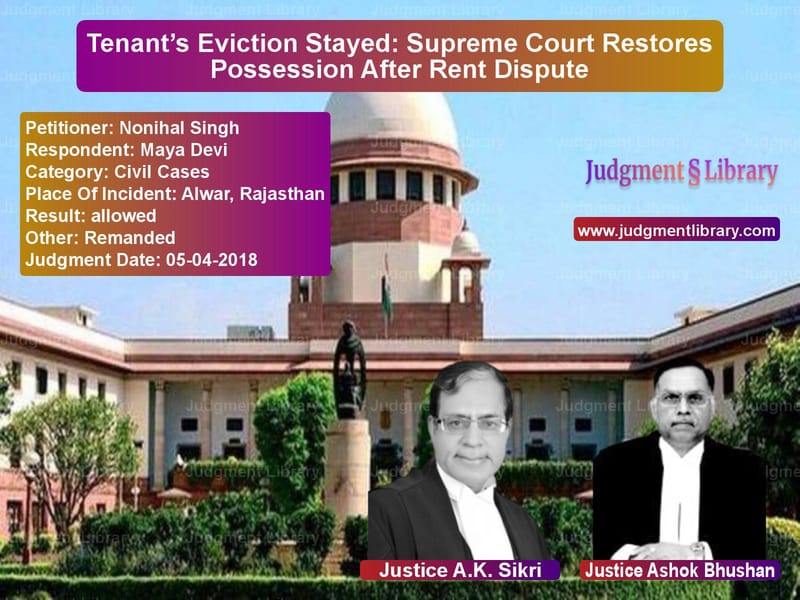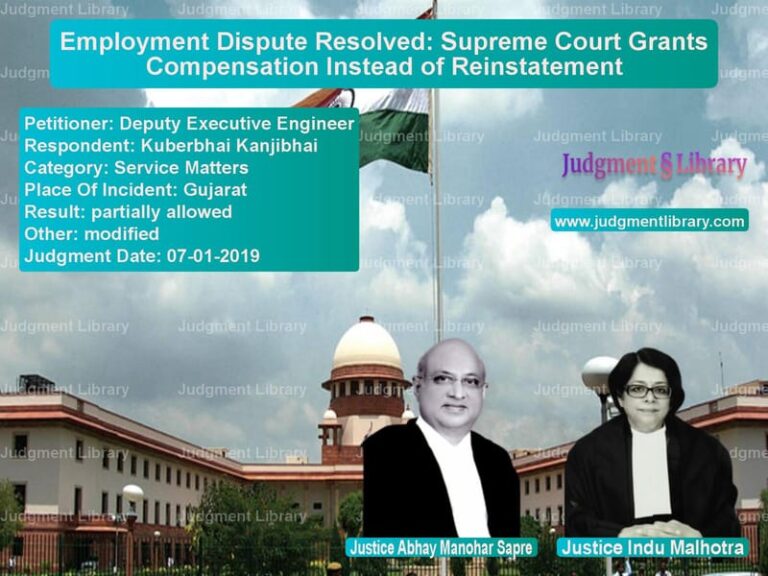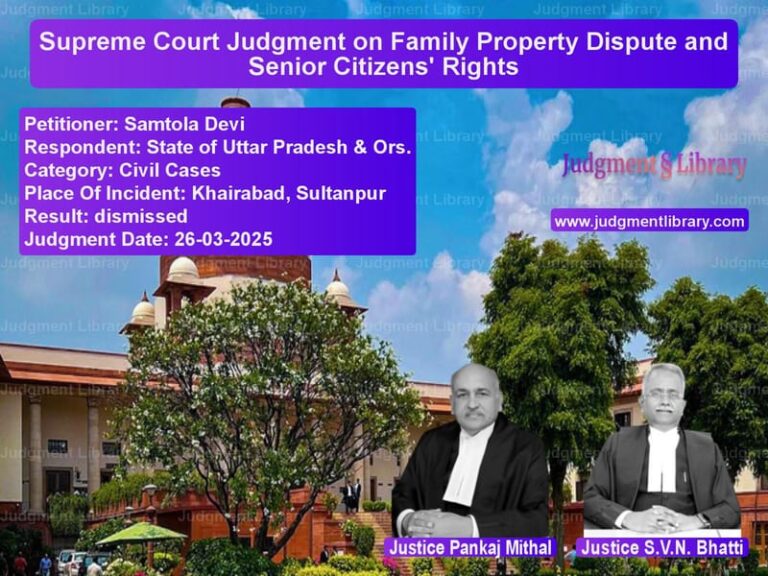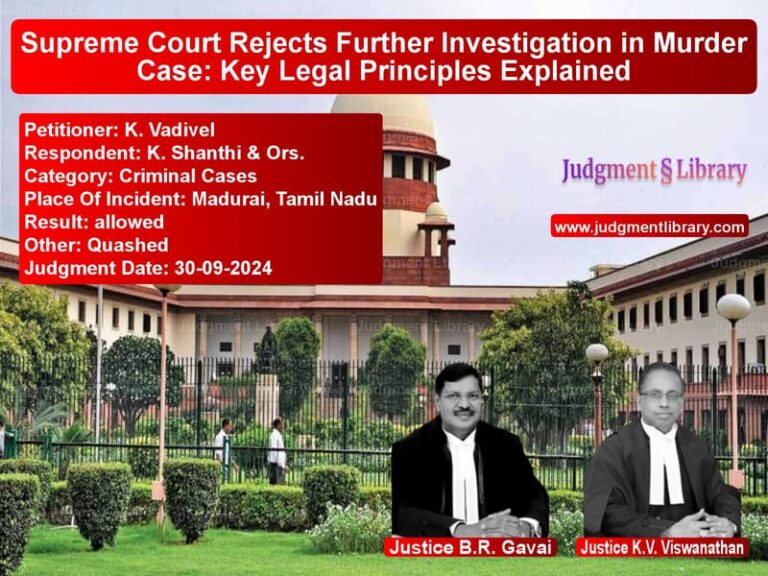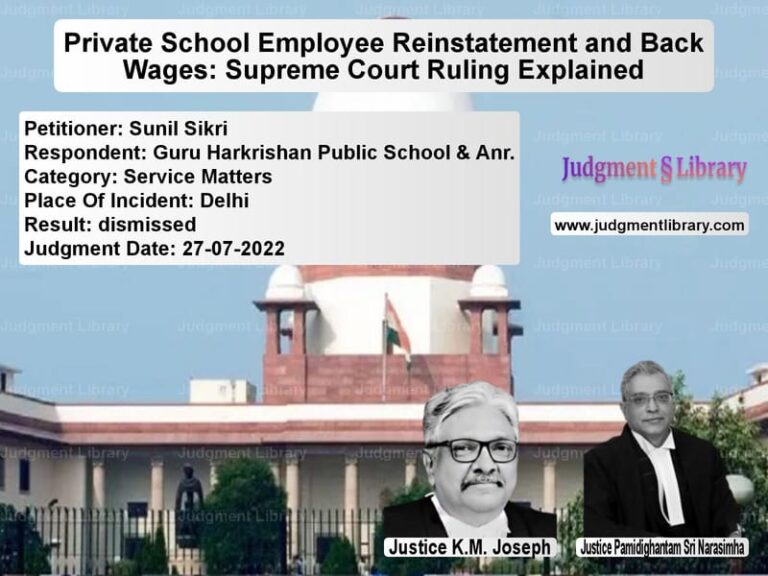Tenant’s Eviction Stayed: Supreme Court Restores Possession After Rent Dispute
The Supreme Court of India, in the case of Nonihal Singh v. Maya Devi, ruled on a tenant-landlord dispute regarding eviction and non-payment of rent under the Rajasthan Rent Control Act, 2001. The appellant, a tenant, had failed to pay arrears of rent, leading to eviction orders. However, after reviewing the payments made and procedural lapses, the Supreme Court set aside the High Court’s orders and restored the tenant’s possession.
The judgment, delivered by a bench comprising A.K. Sikri and Ashok Bhushan, emphasized the importance of procedural fairness and ensuring that judicial remedies serve the ends of justice rather than imposing undue hardship.
Background of the Case
The dispute began when the respondent-landlady, Maya Devi, filed an eviction application against the appellant-tenant, Nonihal Singh, under Section 9 of the Rajasthan Rent Control Act, 2001. The primary ground for eviction was default in the payment of rent.
The Rent Tribunal of Alwar, in its judgment dated April 5, 2014, ruled in favor of the landlady and ordered the tenant to vacate the premises within six months. Additionally, the tribunal directed the tenant to pay arrears of rent and mesne profits from the date of filing the eviction application until the final judgment.
Chronology of Legal Proceedings
- Rent Tribunal’s Order (April 5, 2014): The tenant was directed to vacate the property within six months and pay mesne profits.
- Rent Appellate Tribunal’s Order (May 3, 2017): The tenant’s appeal was dismissed, upholding the eviction order.
- High Court’s Order (November 1, 2017): The tenant was allowed to stay until April 30, 2019, provided he paid arrears of rent and mesne profits within two months.
- Non-Compliance and Subsequent Dismissals: The tenant failed to deposit arrears of rent by the stipulated deadline (December 31, 2017), leading to the rejection of his applications for extension (January 15, 2018) and delay condonation (February 27, 2018).
- Execution Proceedings (March 27, 2018): The landlady took possession of the premises.
- Supreme Court Ruling (April 5, 2018): The eviction was stayed, and possession was restored to the tenant.
Arguments Presented
Tenant’s Arguments
The tenant argued:
- That he had deposited the arrears of rent and mesne profits before the High Court passed the final rejection order.
- The execution court had recorded full satisfaction of the payment, yet the High Court dismissed his applications for extension and delay condonation.
- That the possession was taken by the landlady despite his compliance with the High Court’s order.
Landlady’s Arguments
The landlady contended:
- The tenant failed to pay arrears on time, leading to rightful execution of the eviction order.
- The payment made later by the tenant was incomplete and not in accordance with the tribunal’s original order.
- The tenant had been occupying the premises for years without paying the proper rent.
Supreme Court’s Observations
The Supreme Court took into account the tenant’s belated payments and the full satisfaction recorded in execution proceedings. The Court noted:
“The High Court exercises jurisdiction under Article 226 and 227 for the purpose of securing the ends of justice. It is true that the amount of arrears of rent as per the order dated 01.11.2017 was to be deposited till 31.12.2017, but since the amount could not be deposited, an application for extension of time was filed. We have no doubt that had it been brought to the notice of the High Court that the amount of ₹96,997/- had been deposited on 12.01.2018, the Court would have considered the fact that a substantial amount had been deposited before the rejection order.”
The Supreme Court highlighted that:
- The tenant had paid ₹96,997/- in execution proceedings on January 12, 2018, covering rent arrears from September 4, 2003, to March 19, 2017.
- Another sum of ₹33,000/- was deposited on February 15, 2018 towards mesne profits.
- The execution court had already recorded full satisfaction, meaning the High Court’s rejection of extension was unfair.
- Since the High Court had granted the tenant the right to stay until April 30, 2019, the eviction in March 2018 was premature and unjustified.
Final Judgment
The Supreme Court ruled:
“We set aside the orders of the High Court dated 15.01.2018 and 27.02.2018 and further direct that the appellant be put back in possession of the premises within a period of one week. The appellant shall continue to deposit the mesne profit as per the order of the High Court dated 01.11.2017.”
Implications of the Judgment
- This ruling reaffirms the importance of procedural fairness and adherence to judicial orders.
- It underscores that High Courts must consider all relevant facts, including payments made during execution proceedings, before rejecting relief applications.
- Tenants must strictly comply with court orders but also have the right to seek judicial remedy if procedural lapses occur.
- Landlords must ensure that execution of eviction orders aligns with prevailing judicial decisions and satisfaction of rental payments.
This judgment serves as a precedent in tenant-landlord disputes, ensuring that eviction is carried out only when legally justified and in accordance with due process.
Petitioner Name: Nonihal Singh.Respondent Name: Maya Devi.Judgment By: Justice A.K. Sikri, Justice Ashok Bhushan.Place Of Incident: Alwar, Rajasthan.Judgment Date: 05-04-2018.
Don’t miss out on the full details! Download the complete judgment in PDF format below and gain valuable insights instantly!
Download Judgment: Nonihal Singh vs Maya Devi Supreme Court of India Judgment Dated 05-04-2018.pdf
Direct Downlaod Judgment: Direct downlaod this Judgment
See all petitions in Property Disputes
See all petitions in Landlord-Tenant Disputes
See all petitions in Judgment by A.K. Sikri
See all petitions in Judgment by Ashok Bhushan
See all petitions in allowed
See all petitions in Remanded
See all petitions in supreme court of India judgments April 2018
See all petitions in 2018 judgments
See all posts in Civil Cases Category
See all allowed petitions in Civil Cases Category
See all Dismissed petitions in Civil Cases Category
See all partially allowed petitions in Civil Cases Category

